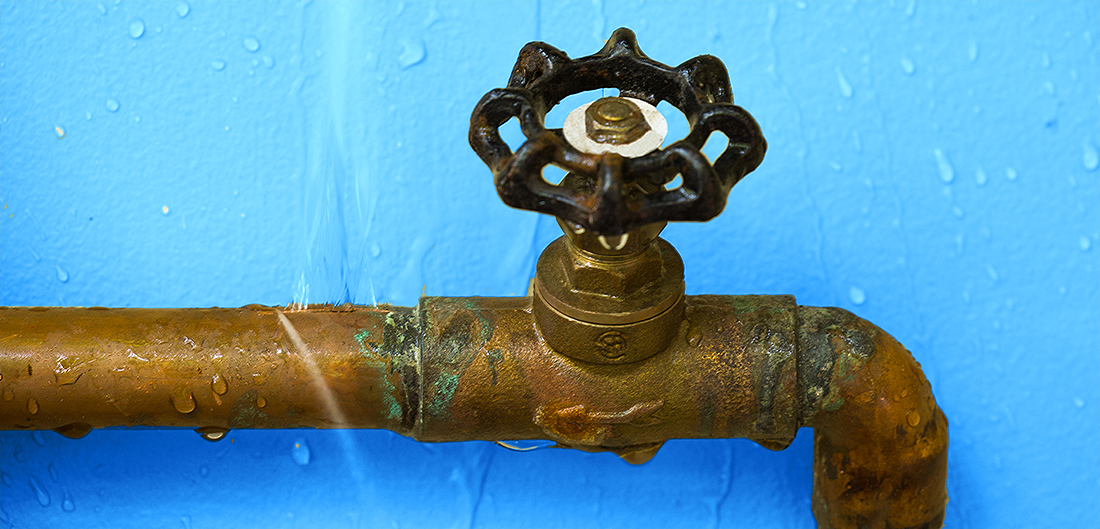 Frigid winter temperatures can cause pipes to freeze or even burst. Do you know how to tell if pipes are frozen? We’ve pulled together tips to help prevent frozen pipes and a list of suggestions for you to follow if they do freeze or burst.
Frigid winter temperatures can cause pipes to freeze or even burst. Do you know how to tell if pipes are frozen? We’ve pulled together tips to help prevent frozen pipes and a list of suggestions for you to follow if they do freeze or burst.
Symptoms of Frozen Pipes
One of the earliest signs of a frozen pipe is when no water comes out of your faucet when you turn it on. If you notice that, head first to the basement and check to see that the water is still turned on and that you don’t have a leak. Once you’ve confirmed these two things, continue your inspection to make sure one of your pipes has not burst. If your search reveals that your pipes are frozen but none have ruptured, you have two choices:
- Call a plumber to help thaw your frozen pipes. This is a good idea if you don’t think you can safely thaw the pipes yourself, you don’t know where the frozen pipes are, or you can’t access the frozen area.
- Attempt to thaw the frozen pipes yourself. Be aware this option can be dangerous if not done correctly.
What to do Immediately if a Pipe Bursts in Your Home:
- Locate and turn off the main water shut off.
- Open the faucets and leave them open to drain the reminder of the lines.
- Open the cabinets and bathroom vanity doors.
- Raise the thermostat and use fans to direct heat into colder rooms.
- If you do not have heat, leave the faucets open to relieve pressure in the water lines.
- Clean up any water and evaluate whether a professional mitigation company is necessary.
- Consult with a professional plumbing company for thawing the pipes and making any necessary repairs. Save any broken pipes from the plumbing repairs for evidence and inspection.
- Move any personal belongings from affected areas into unaffected areas of your home. If any of your personal items are damaged, take inventory and keep all of the damaged items until your insurance representative can inspect them. If that’s not possible, take good photos of all damaged property.
- Call your insurance carrier or your local Assure America agent. Your insurance company will assign an adjuster and conduct a thorough loss inspection. The adjuster will determine which coverages apply.
How to Fix Frozen Pipes Before They Burst
If you attempt to thaw the frozen pipes yourself, keep the following tips in mind:
- Keep your faucet open. Water and steam will be created during the thawing process, and your pipes need an opening to discharge this. Keeping the faucet open also allows for moving water to run through the pipe, which will expedite the thawing process.
- Apply heat to the section of the pipe that is frozen. This can be done by wrapping an electronic heating pad around the pipe, heating the area with a hair dryer, or both. If you lack either of these items, using towels soaked in hot water will help as well.
- Know what not to do. Never use a blowtorch, propane or kerosene heaters, a charcoal stove, or any other open flame device to thaw your frozen pipes. You should also avoid using a space heater unless you are sure the area is clear of any flammable material.
- Continue applying heat until water flow returns to normal. Once you have successfully thawed the pipe, turn on other faucets in your home to check for any more frozen water pipes.
- Take swift action if the frozen pipes are located inside an exterior wall and expose those pipes to warmer air.
How to Prevent Frozen Pipes
While we can’t control the weather, there are things we can do to prevent pipes from freezing. To prevent pipes from freezing and causing major damage, follow these steps:
- Drain water from pipes that are likely to freeze. This includes your swimming pool and sprinkler water supply lines.
- Disconnect any hoses from the outside of your home, drain the hoses and store them in the garage. Make sure to close the indoor valves supplying these outdoor access points.
- Insulate the area around vents and light fixtures. This helps prevent heat from escaping into the attic.
- Seal any wall cracks. Be sure to pay careful attention to the areas around utility service lines.
- Open kitchen cabinets. This allows the warm air to circulate around the pipes.
- Keep the garage doors closed to protect water lines.
- Allow your faucets to drip cold water on the coldest days. The movement will make it harder for the water to freeze.
- Keep your thermostat at the same temperature day and night. Never let it fall below 55 degrees Fahrenheit when you leave your home.
- Ensure you have proper seals on all doors and windows.
- Place a 60-watt bulb in areas where you’re concerned about pipes freezing. Make sure there are no combustible materials near the bulb.
Know ahead of time how your homeowners insurance can help repair damage from a frozen or burst water pipe. Thankfully, when it comes to claims, you don’t have to go through it alone. Call one of our professionals at Assure America. We have locations in: Weirton, Wellsburg and Chester in West Virginia; Steubenville, Ohio; Louisville, Kentucky; and Pittsburgh, Pennsylvania.
Source: Erie Insurance



Post Your Comment